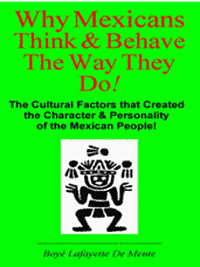 |
 |
 |
 Entertainment | Books | March 2007 Entertainment | Books | March 2007  
New Book Explains Unique Character & Culture of Mexicans & How to Interact with Them
 PRWEB PRWEB


| | "Why Mexicans Think & Behave the Way They Do! - The Cultural Factors that Created the Character & Personality of Mexicans" is available to consumers from Amazon.com, other online booksellers, and through Borders, Barnes & Noble, and other bookstores. It is available to the trade from the Ingram Book Company and Baker & Taylor. |
A new book, "Why Mexicans Think & Behave the Way They Do!- - The Cultural Factors that Created the Character & Personality of Mexicans," should be of extraordinary interest and use to business people, immigration officials, law enforcement agencies, educational institutions and those planning on visiting Mexico as tourists.

Written by Boyé Lafayette De Mente, internationally known for his business and cultural-insight books on China, Korea and Japan, the book not only points out the cultural pitfalls and misunderstandings most people encounter when dealing with Mexicans, it provides pointers on how to avoid these problems and turn the experience with Mexicans into a plus.

Mexicans have a saying: Como México, no hay dos! (There is no other place like Mexico!), and author De Mente not only agrees, he recounts in vivid detail the cultural factors that created the unique character of Mexican men and women.

He writes: "Mexico's traditional values and morals were forged in a caldron of aggressive racism, religious intolerance, male chauvinism, corruption and an elitist political system that connived with the Catholic Church to keep ordinary people ignorant and powerless and deny them the most basic human rights."

"But," he adds, "the reality of Mexico has always been obscured behind a variety of masks - of piety, pride, courage, gaiety, indifference and stoicism."

De Mente relates how the sexual miscegenation policy of the Spanish conquistadors who destroyed the Aztec empire, and the Spanish administrators and military forces that followed them, created a new race of mix-bloods - mestizos - whose only source of pride and dignity - for mestizo men in particular - was an extreme form of machoism and personalism that was to plague the country down to modern times.

"Personalismo or personalism was and still is the foundation of Mexican society - in business as well as in social relationships," he says. "It still rules the lives of Mexicans to a degree that is both fascinating and frustrating, especially to Americans."

De Mente also explains the traditional Mexican view and use of time, of truth, of respect, of face, and the simpatico syndrome. He says that the historical Catholic Church-inspired taboo against criticism of any kind - of anybody about anything - was the primary factor in the continuation of the negative facets of Mexican culture down to recent times.

He goes on to say that despite the fact that the traditional character of Mexicans is a mixture of medieval Catholicism, traditional Indian and Spanish authoritarianism, machoism and self-serving personalism, it has another face: an inherently joyful nature that manifests itself in music, singing, dancing and art.

"For Mexicans life is very personal, very intense," he adds. "One is always on a stage; with every action, every word, subject to careful scrutiny that must measure up to cultural standards of courtesy, dignity, pride and self-respect in a virtual world based on situational ethics and morality instead of principles."

"But," he continues, "the same character and personality attributes of Mexicans that often frustrate foreigners in their attempts to understand and deal with Mexico can also make life there deeply satisfying emotionally, spiritually and intellectually."

"Why Mexicans Think & Behave the Way They Do" removes the masks that have traditionally obscured the realities of Mexican culture, and in doing so provides invaluable insights that make it possible to both understand and deal more effectively with Mexico.

Other books on Mexico by De Mente include "There's a Word for It in Mexico! - The Complete Guide to Mexican Thought & Culture" and "Romantic Mexico - The Image & the Realities!" | 
 | |
 |



